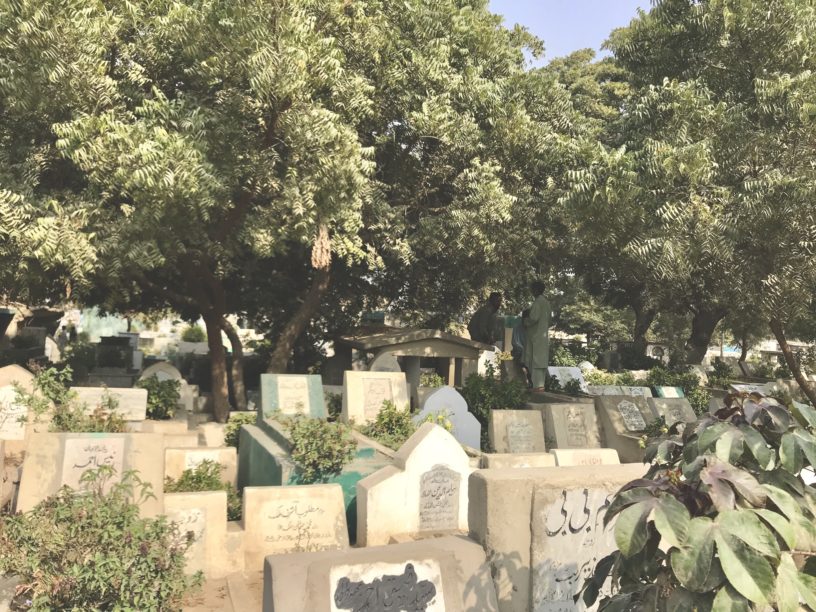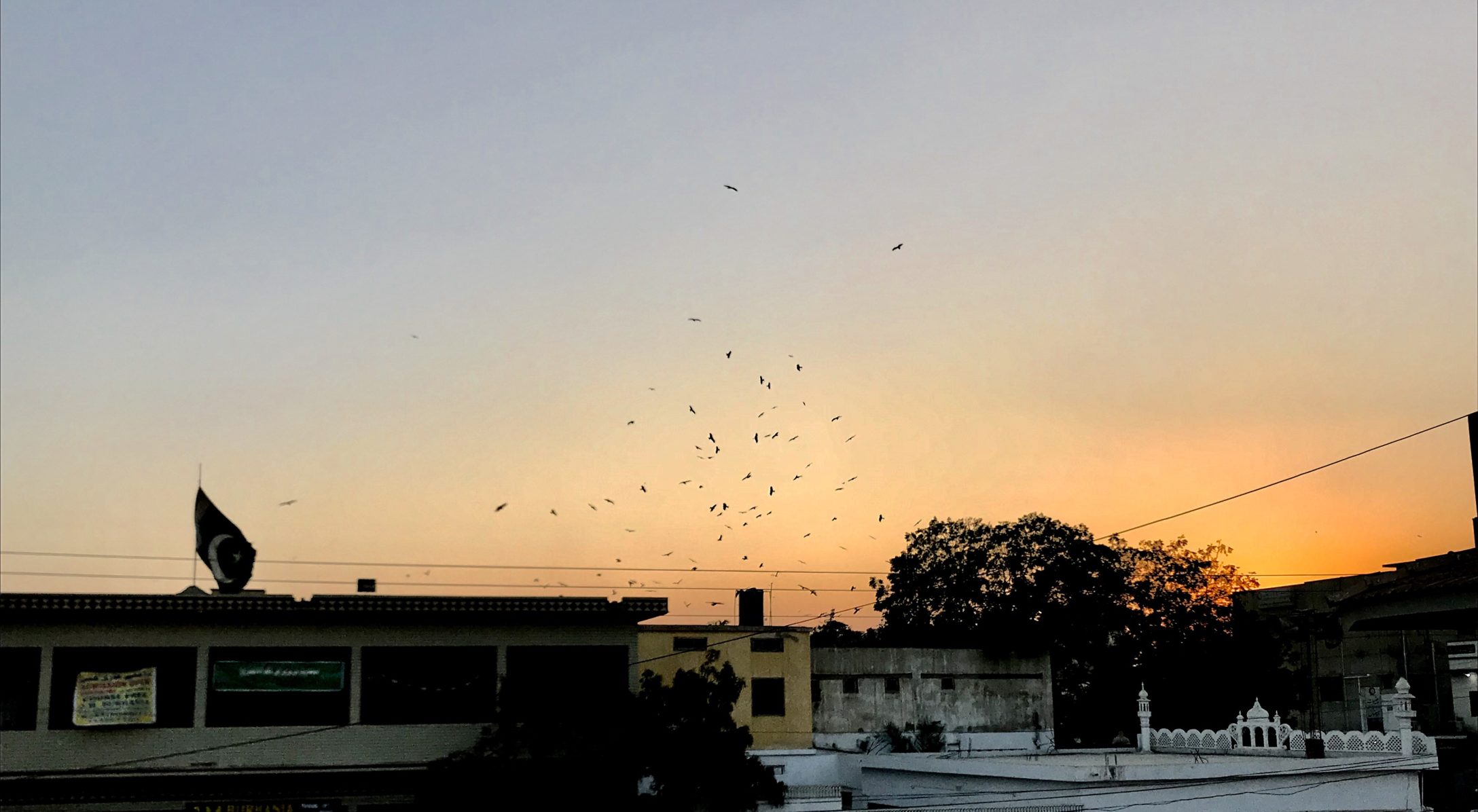December 13, 2018
Karachi, Pakistan
I walked up to the roof, because the elevator often stopped suddenly and no one responded if you pressed the emergency button. The stairs were a maze with cats sleeping on almost every other step. I was awake before the crows began gathering on rooftops and the milkman started riding his bike around the block. The man in the apartment next to Chote Ma’s pretended to water the plants while smoking his early morning cigarette instead. His wife checked the water level in the old Pepsi-bottle-turned-watering-can when he went inside. Chote Ma is my youngest uncle, and he lives on the first floor of a building in Karachi’s biggest military containment, even though he isn’t in the military. This enclosed community is a city of its own, with malls and groceries shops and restaurants. Visitors have to show identity cards when they enter and cars are thoroughly checked because of all the ammunition stored here.
I sat on a ledge while I waited for the sun to rise. Karachi is an attack on the senses, from the flavours in the food to the smell of petrol that fills your nostrils whenever you step outside—it all asks you to recognize its existence. As the sky went from pink to its regular dusty gold, I made notes on my new copy of The Greatest Urdu Stories. I kept going back to “Laajwanti,” a story about the women who were abducted during the India-Pakistan partition.
The last time I came to this city by the sea, over a year ago, I sat in first class with Ami, and massaged her legs for almost the whole flight. My siblings and I were taking my mom to Pakistan so she could get end-of-life care surrounded by her siblings, and so that she could be buried with her parents.
This time, I travelled over 14 hours alone from Toronto. Most of those hours were spent listening to the aunty beside me talk about her son, a software engineer who lives in Toronto. I grew up thinking of Karachi as home; I learned how to walk and talk and chew here. Even after my grandparents passed away and my uncles moved, Ami brought my siblings and me back as soon as school year ended. This was the first time I was here without her.
Everything looked foreign. My grandparents’ house had two black gates now, one entrance for each family renting the two floors. The white concrete walls acting as a fence had even more cracks in them than they used to, the bougainvillea vines surrounding the verandah had been cut down and replaced with iron-grills to keep out intruders. I spent most summers in this house around the corner from a mosque and a tailor’s shop, in the older part of Nazimabad.
Chote Ma dropped me off at my other uncle’s house, a block away from my grandparents’ old house, on his way to work. He spent the almost-hour long ride telling me about the etiquette of going to a cemetery. When I got to Anu Ma’s, he continued educating me on how to respect the deceased. We ate roghni roti and he explained the importance of taking a shower before you go to the cemetery, wearing clean clothes and reading prayers I had never heard before. I was too distracted by the sound of the man who sold used sweaters and gloves on a cart in the middle of the street to pay attention. My aunt, Uzma Mami, kept telling me to take another piece of bread. She didn’t know I was so nervous about visiting my mom’s grave this afternoon that I would throw up the few bites I had eaten.
The first time I heard about supernatural creatures was when I was eight. My cousins and I sat in my grandmother’s room and ate chilli milli while our uncle told us about the djinn in the abandoned house down the street. The owners couldn’t sell the house because everyone who went in left with large unexplained bruises. According to him, there were more djinns in Karachi because of all of the people who had died there during the partition. As I ironed Nani’s white salwar kameez, which I found in the basement inside a suitcase with Ami’s wedding outfit — I thought about wandering spirits again. The idea that Ami existed in this place that was home to all of these bodies, and maybe even all of these spirits, was nauseating.
My cousin made me a herbal mask to put on my face, which made my skin feel tight and itchy. The geyser wasn’t working so I had to take an ice-cold shower. Chunks of the brown mask clogged the small drain. I left the house with soaking wet hair, my skin sticky from the coconut oil I had rubbed all over my body. Red strands visible through white dupatta on my head and stretch marks through the sleeves on my kurta.
On the way to the cemetery, we stopped at six different flower shops to find a bouquet of white tuberoses. Shops opened later in the afternoon and it is always hard to find fresh flowers here. Anu Ma kept asking me about the all the things Ami said in the end. I told him about the broken oxygen monitor instead.
At the entrance of the cemetery, there was a yellow and black long-tailed minivet sitting on top of a pile of red rose petals. A man was selling these withered remains to visitors who wanted to scatter them over graves. These flowers reminded me of the flowers decorating a bride’s room the day after her wedding. The colour is meant to represent celebration, but they had a really short lifespan. The man in a pistachio green salwar kameez also sold tombstones and large sheets with prayers embroidered on them. I had heard that women don’t usually go to the cemetery, that your deceased loved ones know when you visit, and that it’s okay to step on the other graves because of overcrowding.

Less than 100 metres away, there were apartment buildings with rusted windows. I thought about all of the djinns that might have lived inside of the buildings and all of the people, and how they co-existed. I walked along the edges of the graves trying not to crush the hundreds of ants that covered the cement and soil. I stopped to read all of the names leading to Ami’s. Rifaat Masood was the name of the woman next to her; she was born in Bhopal and there was no birthdate written on her tombstone. Neem leaves and purple flowers were growing under the message we had engraved for Ami. Humari pyaari Ami, aab humaisha azaad aur roshan: our beloved mother, now forever free and illuminated. When we were picking a style for her grave, I told my brother that we should choose marble because it will be more durable, but he told me that graves are meant to be temporary here. Eventually, they will break down Ami’s tombstone and use this resting spot for someone else.
As my cousin, Hamza, recited Surah Mulk, the minivet flew around me and onto the neighbouring grave. I wrapped my arms so tightly around the flowers I brought for Ami’s grave that I couldn’t raise my hands in prayer. Under the toote tree on the left, two men were digging a grave for a little girl.
Do I believe that people die and become dust, and yet still live on as spirits? Do I believe in djinns that occupy homes and animals and sometimes even human bodies? Do I believe that the place I once thought of as home will still be home if the person who connects me to it is no longer here? I didn’t figure anything out, but on the way back to Anu Ma’s house, we bought pomegranates. I walked around the block, with a bowl full of the sweet and sour fruit sprinkled with salt and pepper, in search of chameli flowers. Ami said the fragrant white flower was planted in corners throughout the city and served as a reminder of the things that survive.






